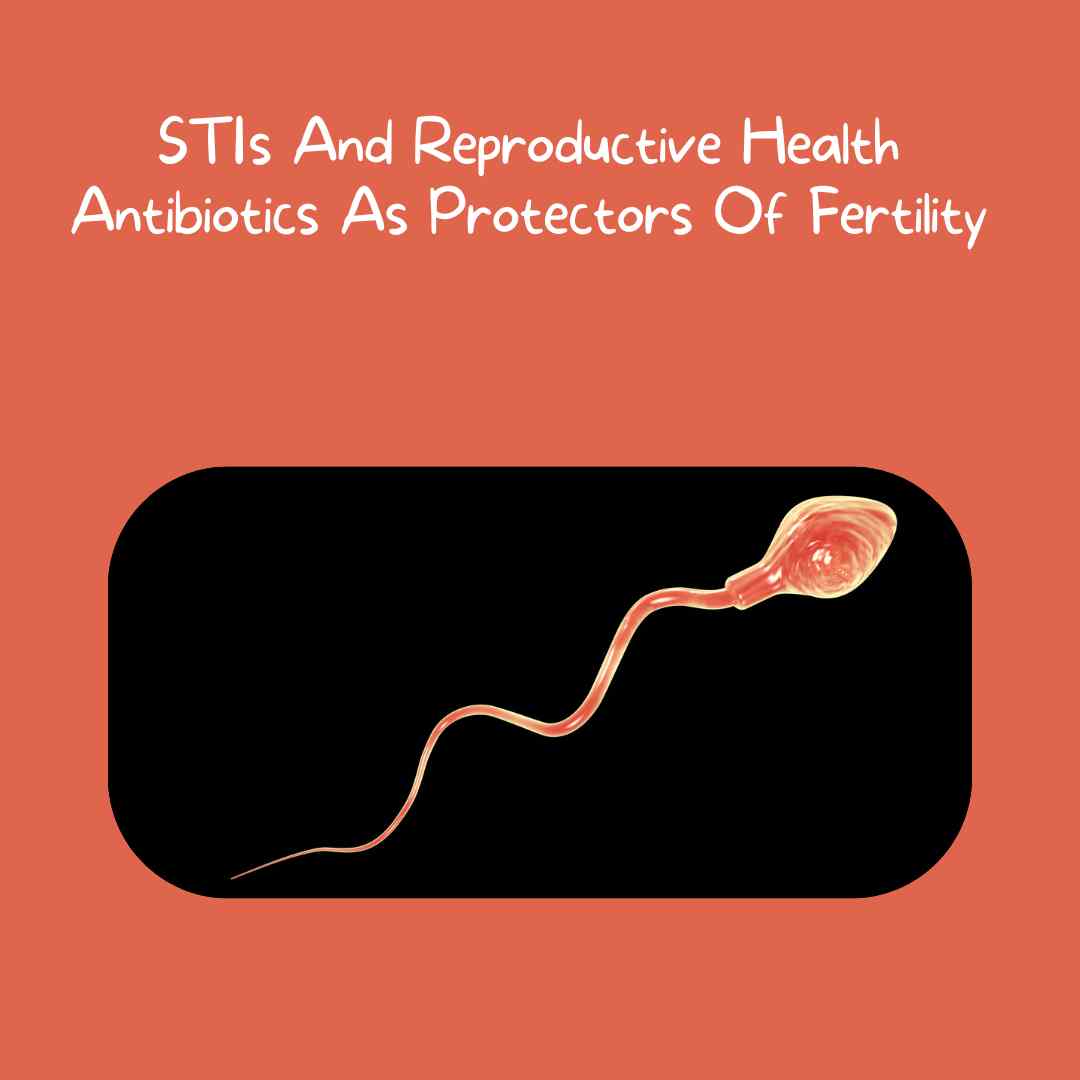STIs Reproductive Health Antibiotics As Protectors Of Fertility

we are here to talk about STIs Reproductive Health Antibiotics. As a woman, I know how important it is to stay informed about sexual health and fertility. That’s why I was so interested to learn about the topic of STIs and reproductive health and antibiotics as protectors of fertility. With the right information, we can make the best decisions about our bodies and our health. This article will discuss the role of antibiotics in protecting fertility while also providing information about the risks of STIs to reproductive health. It will also provide tips and advice on how to protect yourself from infection and how to maintain your fertility. I look forward to sharing this important information with you.
STIs Reproductive Health
Sexually transmitted infections (STIs) are a major public health issue affecting millions of people around the world. In particular, STIs can have a serious impact on reproductive health. As such, understanding the risks associated with STIs and the remedies available is essential to safeguarding fertility.

One such remedy is the use of antibiotics. An increasing number of studies, such as one conducted by the National Institutes of Health, have concluded that antibiotics can protect against STIs and therefore help to preserve fertility. Antibiotics work by reducing the risk of infection in the reproductive organs, helping to safeguard against the damaging effects of STIs.
Antibiotics can be used to treat existing infections and as a preventative measure. This makes them a versatile tool to protect reproductive health, as well as general health and well-being. Furthermore, when antibiotics are used correctly, they can be highly effective in preventing infections and their associated health risks.

In addition to antibiotics, a number of other treatments and strategies are available to help protect against STIs and their effects. These include abstaining from sexual contact, using protection, and receiving regular checkups. Such measures can help to reduce the risk of infection and ensure that reproductive health is safeguarded for the future.
Overall, antibiotics play an important role in protecting fertility from the damaging effects of STIs. Through their use, along with other preventative measures, it is possible to safeguard reproductive health and ensure the wellbeing of individuals and communities.
What are STIs?
Sexually transmitted infections (STIs) are infectious diseases spread through sexual contact, either through contact with infected body fluids, skin-to-skin contact, or an exchange of bodily fluids. STIs can be transmitted through many forms of sexual activity, including vaginal, anal, and oral sex. Unfortunately, they are becoming increasingly common, with the Centers of Disease Control and Prevention estimating that 20 million new infections occur in the United States each year.
Although the consequences of STIs can range from mild to serious, they can affect both men and women in different ways, such as causing fertility issues or infertility. For example, pelvic inflammatory disease (PID) is an infection of the reproductive organs in a woman that is caused by a sexually transmitted infection and is a major cause of infertility.

Fortunately, antibiotics are one of the main treatments for many STIs and can help protect fertility. It is recommended by the American College of Obstetricians and Gynecologists (ACOG) that all sexually active women be tested for STIs at least once a year. Additionally, condoms are the best way to reduce the risk of being infected with an STI and can also help protect fertility.
It is important to take steps to protect your fertility and reproductive health, and understanding the risks of STIs and learning how to protect yourself from getting infected is an important part of taking care of your reproductive health. Remember, if you think you may have been exposed to an STI, it is important to visit your healthcare provider and get tested as soon as possible.
Effects of STIs on Fertility
Sexually transmitted infections (STIs) can have serious consequences on fertility, including permanent infertility. According to a study from the World Health Organization, an estimated 140 million people worldwide are affected by Chlamydia, Gonorrhoea, and Syphilis. Of those infected, 15 million women have an increased risk of infertility. Furthermore, STIs can cause damage to the reproductive organs, leading to inflammation and scarring, which can prevent a woman from conceiving.
In some cases, STIs can increase the risk of miscarriage or preterm delivery. For men, untreated STIs can lead to a lower sperm count and motility, and may also cause inflammation in the prostate and/or testicles. In rare cases, some bacterial STIs can cause a blocked ejaculatory duct, leading to fertility issues.
Antibiotics are an effective way to treat STIs, and can in some cases reverse the side effects they can have on fertility. It is therefore important to practice safe sex and get tested for STIs regularly. Resources such as Planned Parenthood offer screening and treatment for STIs, as well as contraception and reproductive health advice.
Antibiotics as Protectors
Reproductive health is essential for all stages of life. As such, it is important to understand the impact of sexually transmitted infections (STIs) on fertility. Fortunately, antibiotics can play a key role in protecting against STIs and preserving fertility.
Those who are sexually active are encouraged to practice safe sex and get screened regularly for STIs. If detected early, many STIs can be treated with antibiotics. For example, a single dose of azithromycin can be effective in treating chlamydia but not gonorrhea. Additionally, antibiotics can help to reduce the risk of PID, a condition caused by STIs that can lead to infertility.
Antibiotics may also be used to treat endometritis, a gynecological condition caused by a bacterial infection in the uterus. Endometritis can lead to infertility, but antibiotics can help to reduce the risk of this condition. Research has also found that antibiotics can help to reduce the risk of infection after IVF, decreasing the chances of infertility.
Statistics show that 12.1 million women worldwide experience infertility each year, with STIs playing a large role in this number. Those who are sexually active should practice safe sex and those who are experiencing infertility should speak with a healthcare provider about the potential benefits of antibiotics. With the right information and treatment plan, individuals can protect themselves from STIs and preserve their fertility.
Resources:
CDC: STIs
WHO: Infertility
Mayo Clinic: PID
National Institute of Health: Endometritis
Benefits & Risks of Antibiotics
According to the Centers for Disease Control and Prevention, Sexually Transmitted Infections (STIs) remain one of the most common infectious diseases globally. STIs can severely impact reproductive health, particularly fertility. As such, it is important to identify and use appropriate measures to protect and maintain fertility. Antibiotics are a powerful tool that can play an important role in protecting fertility.
Studies have shown that antibiotics can reduce the risk of pelvic inflammatory disease – a common STI-related reproductive health disorder – in women. Furthermore, antibiotics can be used to treat other common infections that can affect fertility such as chlamydia or gonorrhea. Antibiotics are also effective in treating other STIs including HIV, syphilis and trichomoniasis.
Yet, despite their many benefits, antibiotics can have negative effects on fertility too. Antibiotics may disrupt the delicate balance of bacteria in the body, leading to bacterial vaginosis, which can cause infertility in women. Additionally, antibiotics can reduce fertility in men by affecting sperm motility and decreasing sperm counts.
Therefore, it is important to ensure that antibiotics are used appropriately. This means that when prescribing antibiotics, medical practitioners should take into consideration a patient’s reproductive health and fertility needs. Ultimately, antibiotics can be an effective tool in protecting fertility, however, they should be used carefully and with caution.
STI Prevention & Treatment
Sexually transmitted infections (STIs) are a growing concern, especially in reproductive health. According to the Centers for Disease Control and Prevention (CDC), there were nearly 2.5 million cases of STIs reported in the United States in 2017. Protecting fertility from STIs is of utmost importance, and antibiotics are one of the most effective methods of doing so.
Antibiotics are a class of drugs that are used to treat infections caused by bacteria. When it comes to STIs, antibiotics can be used to effectively treat infections such as chlamydia, gonorrhea, and syphilis. Once prescribed, they can protect reproductive health and help preserve fertility.
It is important to be aware of the potential risks associated with STIs and take appropriate measures to protect one’s health. Abstaining from sexual activity or using condoms are two of the most effective ways to prevent STIs. Additionally, regular screenings are important for early diagnosis and treatment.
When it comes to antibiotics, it is important to take them as prescribed. Additionally, it is important to discuss any potential side effects with a healthcare professional. Taking antibiotics can help protect reproductive health and preserve fertility, but it is important to weigh the risks and benefits of these medications.
Overall, STIs can have serious consequences for reproductive health, but there are steps one can take to protect fertility. Abstinence, condoms, and regular screenings are all key components of STI prevention. Additionally, antibiotics can be used to effectively treat many STIs and protect reproductive health.
Antibiotic Resistance
Reproductive health is an important issue for both men and women, and the spread of sexually transmitted infections (STIs) can have a major impact on fertility. One of the key ways to prevent STIs is through the use of antibiotics, which can help protect fertility. However, due to antibiotic resistance, this use of antibiotics is becoming less effective in protecting reproductive health.
Antibiotic resistance occurs when bacteria become resistant to the effects of antibiotics. This phenomenon has been on the rise in recent years due to overuse and misuse of antibiotics. In the US, the Centers for Disease Control and Prevention (CDC) has reported that antibiotic resistance is responsible for more than two million illnesses and 23,000 deaths annually.
While the use of antibiotics can be beneficial in preventing STIs, their effectiveness is decreasing due to the rise in antibiotic resistance. This resistance is a major public health concern, as it puts more people at risk of developing serious reproductive health issues. As such, it is important for individuals to practice safe sex and to be aware of the growing prevalence of antibiotic resistance.
In order to protect reproductive health, it is important to be aware of the risk of STIs and to use protective measures. Additionally, practicing smart and safe antibiotic use can help to reduce the risk of antibiotic resistance and help to protect fertility. To find out more about STIs and antibiotic resistance, individuals should consult their doctor and visit reliable sources such as the CDC and the World Health Organization.
Conclusion
STIs and reproductive health are topics that are very important to discuss. By understanding the role of antibiotics in protecting fertility, we can take steps to make sure that we are doing all we can to protect our reproductive health. It is crucial to be aware of the risks associated with STIs, and to take all necessary precautions to prevent their spread. Additionally, we must remember that antibiotics, if used responsibly, can be a powerful tool in protecting fertility. Let’s all work together to ensure that our reproductive health is taken care of, and our fertility is protected. Let us make the decision today to protect our sexual health and our fertility for the future.